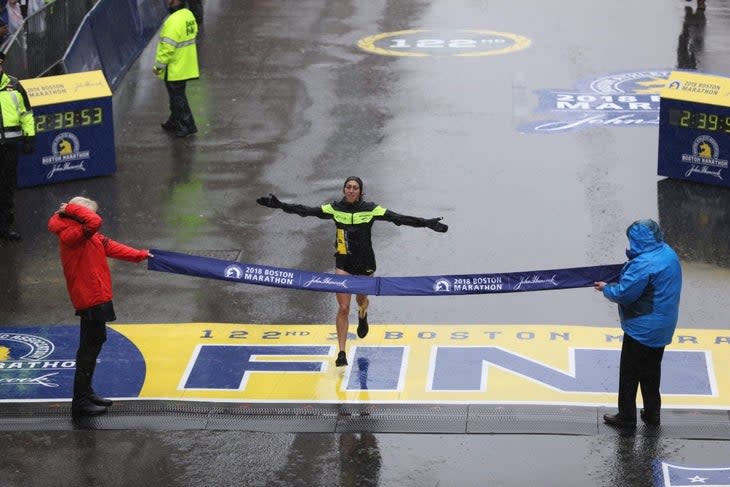Des Linden Reveals All Her Layers in New Memoir ‘Choosing to Run’
- Oops!Something went wrong.Please try again later.
This article originally appeared on Outside
Des Linden's gritty run to win the 2018 Boston Marathon was the stuff of a dramatic sports movie.
While the day's torrential rain and cold and wind drove many of her competitors to withdraw midway through -- or worse, hypothermia -- the 35-year-old persevered to break the 33-year American title drought at the world's most iconic marathon.
Five years later, it's still easy to recall the imagery of the victory: Linden crossing the finish line still fully clothed in her Brooks running jacket, embracing her husband Ryan and her agent Josh Cox, and later chugging champagne out of a shoe.
What Linden reveals in her memoir, "Choosing to Run," written with ESPN alum Bonnie Ford, is that her epic victory almost never happened, due to a secret battle with hypothyroidism, a condition that has become somewhat controversial in the endurance sports world. That's just one of many revelations in the quick read, which goes deep on the financial realities of professional running, including the no-frills lifestyle of Linden's early days with the Hansons Distance Project, the dirty details of contract negotiations, her athlete-coach relationship with former coaches Kevin and Keith Hanson, her Olympic Games disappointments, devastating injuries and her disillusionment with doping problems in the sport.
RELATED: Des Linden Always Keeps It Real

Hypothyroidism: A Life-changing Diagnosis
Linden is a fierce advocate for clean sport, and the fact that her defining Olympic experience was the 2016 Games, in which both the gold and silver medalists in the women's marathon later served doping bans, hardens her perspective.
That makes it all the more confusing when she is diagnosed with hypothyroidism, a common condition in which the thyroid gland fails to produce enough thyroid hormone to support bodily functions. Thyroid medication is taken to combat the chronic fatigue and weight gain that can come with low thyroid levels, and it has become controversial in the endurance sports world due to concern that athletes could take it to improve performance. Thyroid medication has never been listed as a banned substance, though USADA and U.K. Athletics lobbied the World Anti-Doping Agency (WADA) to ban it in 2015.
Her strong feelings on the subject had also recently caused a rift in her relationship with her long-time coaches Keith and Kevin Hanson. They had signed Dathan Ritzenhein to a contract with the Hansons Distance Project just a few months after it was revealed that he had taken synthetic thyroid hormones while under Alberto Salazar and the Nike Oregon Project, though he had no medical need to do so.
"In my mind, thyroid medication was a shortcut drug, something athletes had sought out or been instructed to take with no true medical need," she writes.
The untreated condition sunk Linden into a deep depression, fully depleted her body and nearly ended her professional running career. She learns that her symptoms classify her as having "severe hypothyroidism," and a nurse practitioner tells her that if she doesn't start taking synthetic hormones immediately, she'll wind up in a coma or dead before she can get a second medical opinion.
But even once treated, there's a long road ahead to get to the start line in Hopkinton. Her body's hormones are completely out of whack as she's training herself for the first time. After years of buying into the Hansons Distance Project's training regimen of 120-mile weeks and cumulative fatigue, she realizes her thyroid condition requires the freedom to listen to her own body and adjust on the fly. She also needs to reorient her perception of pain and fatigue -- the very thing that has led to her success as a distance runner.
"A decade at the top level of distance running had conditioned me to believe I was totally in charge of my mind-body connection," she writes. "There's no way I could have become the endurance athlete I was without developing a skewed perception of fatigue and pain. If those sensations were like gradually deepening shades of color, I was blind to one whole end of the spectrum."
RELATED: What is hypothyroidism?

'Choosing to run was the first real decision I ever made'
Linden and Ford expertly weave the 2018 Boston Marathon race day narrative through Linden's life story, each challenge giving more context to the athlete that fans know as the whiskey-drinking, no-shits-giving grinder fueled by the simple mantra of "Keep showing up".
There's the nasty case of plantar fasciitis that ends her college career on a sour note. The numbness she felt in finishing second at the 2011 Boston Marathon, and the motivation that race gave her through the rest of her career. The awkward pangs of outgrowing the Hansons Distance Project. The ecstatic highs of making two Olympic teams, coupled with crushing disappointment at the Games themselves -- in 2012, dropping out of the marathon after two miles with a femoral stress fracture, and in 2016, competing in an unfair field against drug cheats.
Linden is equally molded by her father -- Dennis, a sports fanatic with a disciplinarian streak who requires both of his daughters to stay out of trouble by enrolling in sports year-round -- and by the Hansons, who see the marathon potential in the underachieving All-American from Arizona State who isn't scared away by the prospect of Michigan winters.
Linden writes about these relationships with bracing honesty -- the pressure and scrutiny from her father, the lack of autonomy she feels under the Hansons' training program -- while acknowledging the resources that they provided her.
Running is ultimately Linden's alone, a place where she finds herself, again and again, in defiance of the authority figures who try to control her.
"I realized that running could be my ticket to escape his scrutiny, his temper, and ultimately, his home," she writes of her high school relationship with her father and running. "Some of his values -- his relentless work ethic, his insistence on doing things right, his disdain for shortcuts -- were already deeply embedded in my psyche, but he lost his immediate leverage over me when I found my place in sport... Choosing to run was the first real decision I ever made. I ran because I wanted to, after years of playing other sports because I was told to. It put distance between who I was and who other people told me I should be."
It's easy to see the through line between the stubborn kid from San Diego and the gritty Olympian who decides to keep running on that cold day in Boston.
Linden will always be remembered for her 2018 Boston Marathon. But to reduce her running story to a singular moment does a disservice to one of the sport's most consistent performers, and it's a gift to learn more about the ups and downs of a full career in "Choosing To Run" -- one that, as she toes the line in Hopkinton later this month for her 10th career appearance at the Boston Marathon, isn't slowing down anytime soon.
RELATED: The Effect of Des Linden's Boston Marathon Win on American Running
For exclusive access to all of our fitness, gear, adventure, and travel stories, plus discounts on trips, events, and gear, sign up for Outside+ today.

